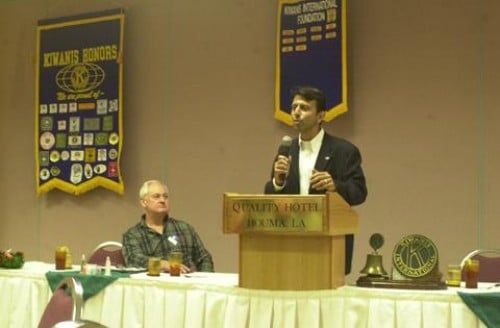December Theatre
December 12, 2006
Wetland tours offer a close-up view of Bayou Lafourche
December 14, 2006Whether or not U.S. Rep. Bobby Jindal has decided to enter the 2008 gubernatorial race still remains unclear, but he has definite thoughts and an action plan to lead Louisiana to a top state in the nation.
All ears and eyes were on Jindal as he spoke at the weekly Kiwanis Club of Houma on Dec. 11, members trying to catch a slip-up or asking hypothetical questions involving the possibility of running for governor.
But Jindal stayed focused on the goal, explaining how hurricanes Katrina and Rita provided a second chance to better Louisiana life, providing a local example: the New Orleans Saints.
“Our state has been given some awful challenges in the last year but now we’ve been given a second chance, like the Saints. They have a new coach and a new quarterback, which they took a chance on. We are going to have to take some chances,” he said.
The first chance is bonding out some of the $2 billion surplus in Baton Rouge, and spending the money wisely, Jindal said.
“Baton Rouge cannot afford to waste this money…and I am sure you are shocked that I said that.”
Jindal said that Baton Rouge cannot afford to play games, recreating political slush funds by shuffling money and renaming accounts. “We need infrastructure,” he said.
Three Areas of Reform
According to Jindal the state has three tasks that need to be taken care of in order to keep people in the state and boost economic growth.
The first step is economic development and creating an inviting environment for new job growth and keeping employers in the state by eliminating restrictive measures like taxing businesses for utilities.
“We need to tell the nation that we are open for business,” Jindal said.
Before luring companies, the problem finding workers to fill vacant positions, still abundant more than a year after the storms, needs to be addressed and Jindal said producing a viable worker pool is dependant solely on the education system.
“In part, we don’t have workers because of the way we train our workforce. On average 80 percent of students (post-high school) start in a four-year program whereas in California, 80 percent start in tech schools. This is why we have the second highest dropout rate in the South,” said Jindal.
His solution would be to provide incentives for learning institutions based on their passing rates rather than the number of students attending. The state’s technical and community college programs need to be well funded to get students in and out, into high-demand jobs.
But before students reach the continuing education level, Jindal said basic education needs a transformation to provide a quality system for students and teachers alike. He warned that using the $1.6 million designated to schools impacted by storms will not help if schools can’t sustain good teachers.
“We are ranked 39th in the country in (classroom) discipline. We ask teachers why they are leaving and the number one answer is because of the environment in the classroom. Times have changed, teachers are afraid to send notes home because parents come back saying it must have been something they did. We need to support our teachers and allow them to discipline students,” he said.
Jindal’s third recommendation to the state is to reform its healthcare system, one of the lowest ranked states in the nation. He suggested using other states as examples to work by.
“We’ve been given a second chance,” he said, “not to rebuild but to improve.”
But Jindal made one suggestion to Congress: to pass the WRDA bill and lend a hand to the people trying to improve their lives and to restore Louisiana’s coasts. He called on residents to continue pressure on lawmakers for Morganza-to-the-Gulf authorization.
Jindal said the journey seems overwhelming but just as the Saints proved by making big gains in the 2006 season, “When you’re at the bottom, the only way is up.”




